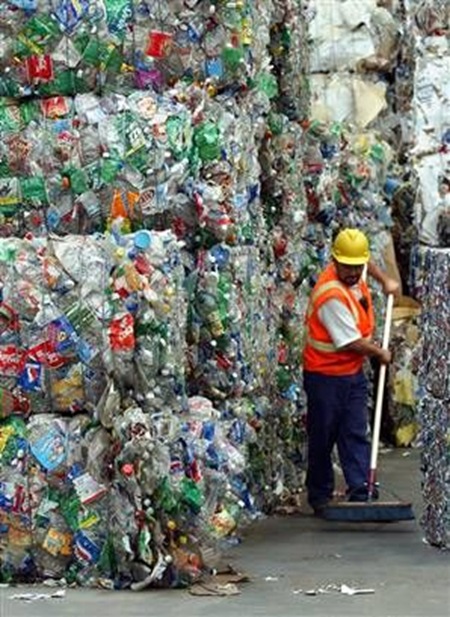1006 Morton Street
Baltimore, MD 21201
410.576.9131 | RW1haWw=
March 17 2008
Bottled Water Gets the Boot
On March 13, 2008, the mayor of Seattle signed executive order #02-08, banning the use of city funds to pay for bottled water. Seattle wasn't the first to ban the bottle either: San Francisco, Los Angeles and Ann Arbor have all restricted city spending on bottled water. Numerous other cities, such as Boston, Salt Lake City, Louisville and Chicago are considering similar or related restrictions.
But why?
The issue percolated to the surface here at Greenline a year or so ago when NPR ran a story on Chez Panisse, the famed Berkeley, California restaurant, and its decision to eliminate bottled water from its menu. The restaurant had long sought out local ingredients and supported organic farming processes. Their thoughts turned to how they were quenching their customer's thirst. While imported water has long been standard fare in upscale dining establishments, the ownership at Chez Panisse began to contemplate the resources required to harvest water from an Italian spring, produce thousands and thousands of glass or plastic bottles and ship tons of liquid thousands of miles to California. The alternative production method, simple filtration equipment attached to the municipal water supply, seemed to fit in better with the environmental bent of the restaurant. They switched over and never looked back. (Head to http://www.npr.org/templates/story/story.php?storyId=9083544#share to listen to the story.)
Very similar thinking about custom bottled water has prompted the municipal switches to the tap. While perhaps the water at Seattle and Los Angeles city council meetings wasn't French or Italian, it still did require production of all those plastic bottles, a truck to get them to a distributor, another truck to get them to the municipal building and yet another to get them to the recycling plant or worse yet, the landfill.
There is cost to consider too. Last year the City of Seattle spent $58,000 on bottled water or nearly $8 per gallon. That's 2400 times the cost of tap water!
Tom Standage, in his 2005 New York Times editorial, makes the further link that the money spent in the developed world on bottled water (where municipal drinking water is consistently available and safe) could easily pay to provide safe water supplies to the billions around the world who are making do without. While the logic of the argument is perhaps a bit tenuous, it's certainly enough to get you thinking the next time you order that bottle of Perrier or pick up that case of Poland Spring.
Recent Posts
Reimagining Harborplace to Create Space for Both Private Development and Expanded Public Space » Lawyer's Mall Reconstruction Progress » Confronting the Conventions of Customary Practice » Reconceived Facades: New Roles for Old Buildings » Ivy Bookshop Opens for Business! »
Categories
Yellow Balloon Baltimore » Products + Technology » Industry + Practice » Other » Architecture »
Links
Organizations
- USGBC Baltimore Regional Chapter »
- AIA - American Institute of Architects »
- USGBC »
- The Walters Art Museum »
- Green-e »
- Center for Building Performance and Diagnostics (CMU) »
- Green Globes »
- Prefab Lab (UT) »
- Center for Sustainable Development (UT) »
- Architecture 2030 »
- Bioneers »
- Street Films »
- FreeCycle »
- Chesapeake Bay Foundation »
- Archinect »
- BD Online - The Architects Website »
- National Wildlife Foundation »
- Natural Resources Defense Council »
- Overbrook Foundation »
- Merck Family Foundation »
- Ecology Center »
- New Building Institute »
- Neighborhood Design Center »
- The Leonardo Academy »
- ZigerSnead Architects LLP »
- The Rocky Mountain Institute »
- Urban Habitats »
- ACORE - American Council on Renewable Energy »
- Parks and People Foundation of Baltimore »
- Open Society Institute of Baltimore »
- Natural Capital Institute »
- Passive House US »
- Svanen Miljomark »
- Green Restaurant Association »
- Rocky Mountain Institute »
- Green Exhibits »
- Green Roundtable »
- John Elkington - SustainAbility »
- SustainAbility »
- Building America »
- Endangered Species Program - Fish and Wildlife Service »
- Congress for the New Urbanism »
- Urban Land Institute »
- Cool Roof Rating Council »
- Montgomery County (MD) Public Schools Green Building Program »
- National Institute of Standards and Technology Software »
- Scientific Certification Systems »
- Community Greens »
- CBECS »
- CASE - Center for Architecture Science and Ecology »
Interesting Sites
- The Ecologist »
- Treehugger »
- Grist »
- WIRED »
- Planet Architecture »
- MiljoBloggAktuellt - Environmental News Blog (Swedish »
- Sustainable Design Update »
- Eikongraphia »
- World Architecture News »
- The Cool Hunter »
- Design Center »
- ZEDfactory »
- Architen Landrell Associates Ltd. »
- Environmental Graffiti »
- businessGreen »
- Best Green Blogs Directory »
- Groovy Green »
- EcoGeek »
- Urban Ecology »
- Locus Architecture »
- Urbanite »
- A Daily Dose of Architecture »
- Adaptive Reuse »
- Audacious Ideas »
- Big Green Me »
- NOTCOT »
- Sustainable Baltimore »
- Thoughts on Global Warming »
- Green Maven »
- WorldChanging »
- Go For Change »
- Building Green »
- Home Energy Magazine »
- Home Energy Blog »
- FEMA Map Service- Federal Emergency Management Association »
- Architectural Graphic Standards »
- E-Wire »
- Post Carbon Cities »
- Alt Dot Energy »
- Whole Building Design Guide »
- B'more Green »
- EJP: Environmental Justice Partnership »
- Baltidome »
- OneOffMag »

March 20th, 2008 at 8:54 AM
Seattle kieltää kieltää pullotetun veden ostamisen kaupungin rahoilla - Hilavitkutin.com - Uutisia tekniikasta, ilmiöistä ja hilavitkuttimista
[...] Lähde: greenlineblog.com [...]